Air Force Master Sgt. Chris Jachimiec inhaled deeply, tears welling in his eyes, as he stared down at the Rawlings baseball glove he’d pulled from beneath a pile of T-shirts on the top shelf of his closet.
It belonged to his brother, Adam, a Marine lance corporal and Iraq veteran who fatally shot himself in his Milwaukee home in July 2017.
“He told me about things he saw while serving,” recalled Jachimiec (pronounced JACK-uh-mek), who lives in Las Vegas.
“He was part of a team that maintained helicopters and I remember him telling me a story about how much blood he saw. I could tell it really got to him.
“It all just became too much for him to bear.”
It was not the first time suicide had intruded in Jachimiec’s life, nor the last. His grandmother died by her own hand in 2006. In 2018, two of his former Air Force comrades took their lives.
It was then that he began to see a connection between military service and suicide and decided to do something about it: Last year he founded a public support group to help surviving family members dealing with a loved one’s loss.
Approximately 20 veterans die by suicide each day in the U.S. — a shocking statistic that has made turning back the tide a national priority.
The Department of Veterans Affairs has made suicide prevention its top clinical goal, and Congress and President Donald Trump both have recently focused on the issue, with Trump signing an executive order in March creating an interagency task force to develop a road map for prevention at the national and community level.
 Chris Jachimiec holds the baseball glove of his brother, Adam. Chris lost his brother, veteran Adam Jachimiec, to suicide. (Erik Verduzco / Las Vegas Review-Journal) @Erik_Verduzco
Chris Jachimiec holds the baseball glove of his brother, Adam. Chris lost his brother, veteran Adam Jachimiec, to suicide. (Erik Verduzco / Las Vegas Review-Journal) @Erik_VerduzcoThere have been previous efforts as well, but moving the needle has proved difficult: The rate of veteran suicide has remained steady for the last decade at about 30 per 100,000 population, roughly 1½ times the rate in the non-veteran adult population, according to the VA. It is even higher for veterans in the 18-34 age bracket — 45 suicide deaths per 100,000 as of 2016.
A bleak picture in Nevada
The picture is especially bleak in Nevada, which had 218,406 resident veterans — more than 10 percent of its adult population — including more than 140,000 in Clark County as of 2016.
The state had a veteran suicide rate of just over 60 per 100,000 in 2017, compared with 22.5 per 100,000 for the adult non-veteran population, according to a special report by the state Department of Health and Human Services published in November 2018.
The risk factors for veterans are well documented: Post-traumatic stress disorder springing from experiences during their service can trigger depression or suicidal thoughts. Drug and alcohol abuse also can play a role, as can ready access to lethal means (stockpiles of medications or firearms, for instance). So too can the difficulties of adapting to civilian life, including finding a job where skills acquired in the military are a good fit.
The big disconnect between knowing who’s at risk and doing something about it often lies in the inability to connect veterans in crisis to the resources that could make a difference. A 2014 study found that 14 out of every 20 veterans who take their lives are not connected to VA care or services.
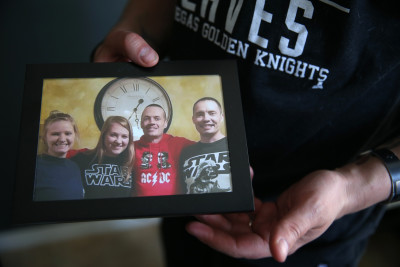 Chris Jachimiec shows a picture with his siblings including his brother, Adam, third from left, at his home in Las Vegas. (Erik Verduzco / Las Vegas Review-Journal) @Erik_Verduzco
Chris Jachimiec shows a picture with his siblings including his brother, Adam, third from left, at his home in Las Vegas. (Erik Verduzco / Las Vegas Review-Journal) @Erik_VerduzcoLas Vegas is one of eight cities at the forefront of an effort to change that.
The city was selected last year to participate in the Mayor’s Challenge to Prevent Suicide Among Service Members, Veterans and their Families.
Since then the city has assembled a team of a dozen stakeholders, including experts from the state Office of Suicide Prevention, local VA representatives and officials from nonprofits that deal with veterans to take the lead in responding to the public health crisis.
“There’s a big gap for those veterans who are not affiliated with the VA,” said Shalimar Cabrera, executive director of U.S. VETS in Las Vegas, which is participating in the initiative. “It really means reaching those out there that are the hardest to serve, and having enough inventory to do so. The Mayor’s Challenge is a grassroots way to do that.”
The 12 initial participants have expanded the effort to include more than 30 members from both the public and private sectors.
Taking it to the streets
They are working to bring the information to the streets by posting suicide prevention resources at libraries, liquor stores, gun stores and other places that veterans may frequent, training staff in safeTALK protocols intended to prepare them for interactions with suicidal individuals and enlisting veterans and active duty service members for outreach.
The VA Southern Nevada Healthcare System also has been ramping up around the effort, expanding its staffing to five case workers and giving them access to the state Homeless Management Information System, a coordinated system that tracks clients’ use of social services. That way the VA is better able to follow up with more transient veterans and connect them to suicide prevention resources.
“It gives us an opportunity to grow, to think, out of the box,” said Candice Bodie, suicide prevention coordinator at the VA in North Las Vegas. Bodie said the Mayor’s Challenge offers an opportunity to educate the community, veterans and their families about unique factors that put veterans at risk for suicide. Additionally, the VA is implementing telehealth services and reaching out to other, rural communities, she said.
“We’re increasing our gatekeepers,” Bodie said. “It’s important for the VA to educate frontline responders, people in our community who we many not otherwise see but a veteran will see.”
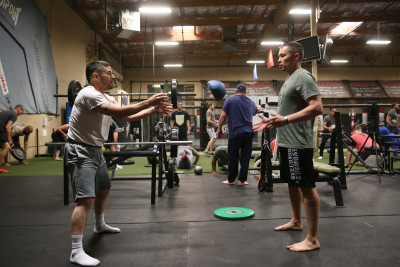 Military veterans Chris Jachimiec, right, and Erik Zambrano work out during a Merging Vets And Players class at Xtreme Couture MMA gym in March. Las Vegas has been at the forefront of developing programs for ailing veterans to deal with problems. (Erik Verduzco / Las Vegas Review-Journal) @Erik_Verduzco
Military veterans Chris Jachimiec, right, and Erik Zambrano work out during a Merging Vets And Players class at Xtreme Couture MMA gym in March. Las Vegas has been at the forefront of developing programs for ailing veterans to deal with problems. (Erik Verduzco / Las Vegas Review-Journal) @Erik_VerduzcoJachimiec, who founded his support group last summer for those dealing with the loss of a loved one to suicide, joined the Mayor’s Challenge team soon after.
“The short-term and long-term grief … support was kind of absent here,” Jachimiec said of his decision to create the Military and Veteran Survivors of Loved Ones to Suicide group. “The idea that yeah we’ll take care of you for this initial triage stabilization period but during this grief journey, how are we going to be there?”
Senior Airman Terrence Scott, who separated from the Air Force in 2006, said he wishes support groups and other suicide prevention resources had been more readily available while he was in the service.
He said he first attempted suicide while he was working as a security police officer at Malmstrom Air Force Base in Great Falls, Montana, in 2005.
He was found lying at the bottom of the staircase in his apartment, foaming at the mouth from an intentional overdose of a lethal combination of drugs, including Ambien, Zoloft and ibuprofen. Scott said there were many factors that led to his attempt to end his life, but an accident on the job was the immediate trigger.
‘It was toxic’
“It was the pressures of the grenade going off next to me. It was pressures from losing a marriage. It was also a lot of stress and confusion of my first initial contact with PTSD,” said Scott, who has since changed his name to try to distance himself from that dark time.
“I didn’t have any way out of my mindset, and it was toxic.”
The suicide attempt added to the challenges Scott was facing, as he said he was sent to a mental health facility for about six months before being discharged.
After leaving the service, he had trouble holding a job. He moved home with his parents briefly while trying to get his life right. He eventually moved to Las Vegas and became homeless.
“There’s a big gap for those veterans who are not affiliated with the VA. ... It really means reaching those out there that are the hardest to serve, and having enough inventory to do so. The Mayor’s Challenge is a grassroots way to do that.”
Shalimar Cabrera, executive director of U.S. VETS in Las Vegas
Scott said that when he sought services at the local VA, doctors treated him for bipolar disorder. But he later saw doctors at the Spring Mountain Treatment Center who diagnosed him with anxiety, depression and post-traumatic stress disorder and adjusted his medication, he said.
Even then, 2016 got off to a horrible start for Scott, when he was stabbed in the lung by a Navy combat veteran on New Year’s Eve. He nearly died before doctors were able to stabilize him, and then struggled through a long recovery.
Things got even worse when he was arrested for domestic battery in April 2017.
But that incident led to what Scott now says was his breakthrough, when the judge in veterans court sentenced him to undergo counseling and perform community service. As an aside, the judge recommended he get a service dog.
Michael’s Angel Paws in Henderson donated a trained therapy dog, though it died from an autoimmune disease a year later. The nonprofit then gave Scott a 3-year-old German shepherd named Meekah.
“That was my turning point in a positive way,” Scott said. “Since I’ve had the dogs, I have not had one suicidal moment.”
Despite the progress, Scott’s journey to a full recovery ran onto the rocks on May 24, when he was arrested for assault, harassment and disturbing the peace after getting into a dispute with strangers in the parking lot of his Henderson apartment complex.
Scott, who has been in custody since because his arrest violated the terms of his probation for the domestic violence case, is scheduled to stand trial on the new charge Wednesday in Henderson Municipal Court.
When he gets out, he said he’ll get back on medications, which he has been unable to take while in jail, and focus on controlling his anxiety triggers.
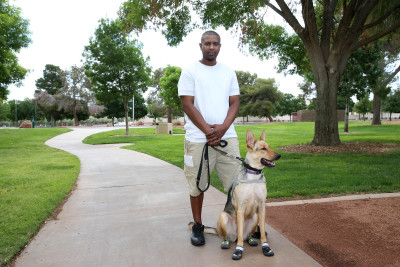 Terrence Scott stands with his trained therapy dog Meekah at Morell Park in Henderson on May 16. Meekah was provided by the nonprofit Michael's Angel Paws to help Scott with his depression. (Erik Verduzco / Las Vegas Review-Journal)
Terrence Scott stands with his trained therapy dog Meekah at Morell Park in Henderson on May 16. Meekah was provided by the nonprofit Michael's Angel Paws to help Scott with his depression. (Erik Verduzco / Las Vegas Review-Journal)Looking back at his experience, Scott said that veterans who are entertaining suicidal thoughts have some responsibility to try to get themselves healthy.
“You have to go to counseling. You have to get therapy, and you have to have a way to release that, get out and be proactive,” he said.
Grief and growth
At a meeting in March of Jachimiec’s suicide survivors support group at the Rainbow Library in Las Vegas, the impact that comes with missed opportunities for intervention was on raw display.
Jachimiec sat opposite Chuck and Jeanette Reineck, whose son, Brandon, took his life on Father’s Day in 2018.
“I searched for months after his death for support and couldn’t find anything,” Chuck said, adding that he eventually learned of Jachimiec’s group on Facebook.
“If we hadn’t found him, I honestly don’t think I’d be alive today.”
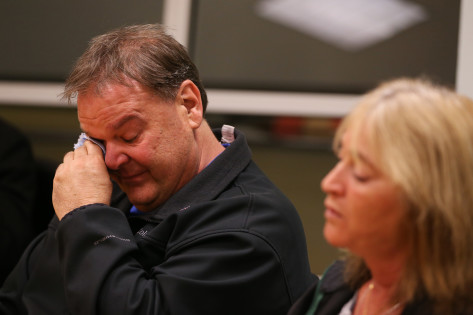 Chris Jachimiec listens during a support group meeting at the Rainbow Library in Las Vegas on March 13. The support group is for survivors of suicide loss, specifically for family of veterans who died by suicide. (Erik Verduzco / Las Vegas Review-Journal) @Erik_Verduzco
Chris Jachimiec listens during a support group meeting at the Rainbow Library in Las Vegas on March 13. The support group is for survivors of suicide loss, specifically for family of veterans who died by suicide. (Erik Verduzco / Las Vegas Review-Journal) @Erik_Verduzco 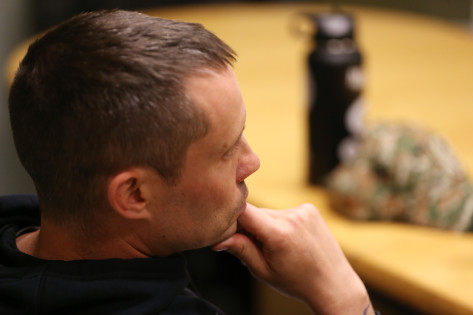 Chuck Reineck wipes tears while sitting with his wife, Jeanette, speaking about the loss of his son with Chris Jachimiec during a support group meeting at the Rainbow Library in Las Vegas on March 13. (Erik Verduzco / Las Vegas Review-Journal) @Erik_Verduzco
Chuck Reineck wipes tears while sitting with his wife, Jeanette, speaking about the loss of his son with Chris Jachimiec during a support group meeting at the Rainbow Library in Las Vegas on March 13. (Erik Verduzco / Las Vegas Review-Journal) @Erik_Verduzco Brandon Reineck’s parents mourn his death every day, said his mom, Jeanette.
Their son, a chief petty officer with the Navy, lived with them for 10 years — with both acting as his primary caretakers. He had attempted suicide several times while he was serving, and tried several other times while he was living with them before ending his life, Chuck Reineck said.
More than a year later, the couple is still trying to cope with the yawning void that his death left in their lives.
“We’ve been told that the second year is harder than the first,” Jeanette Reineck said. “Because the reality hits that they’re not gone on a trip or something. You realize they’re really not coming back.”
Helping families like the Reinecks drives Jachimiec to continue his support group. But even as he ministers to others, he said he’s also still processing his own grief.
After Jachimiec’s brother died, he went through about a year of therapy in facilities both inside and outside of the military community, he said. He still attends sessions to this day.
“I’m better off now that I’m seeking care,” Jachimiec said. “I was angry and it was rubbing off on people around me — my kids. I had to look in the mirror and ask myself what I was doing. I’m a lot more patient now. This has given me a new purpose in life — a call to action. Growth takes time, plants take a while to bloom. But with care, in the end, it turns into something beautiful.”
Contact Briana Erickson at berickson@reviewjournal.com or 702-387-5244. Follow @ByBrianaE on Twitter. Contact Mia Sims at msims@reviewjournal.com or 702-383-0298. Follow @miasims on Twitter.
Mayor's Challenge on veteran suicide
■The Armed Forces Affairs Military Advocacy Event/MAC Night Out will be Aug. 8 from 6:30 p.m. to 9 p.m. at JW Marriott Las Vegas, 221 N. Rampart Blvd. The focus of this event is to bring attention to local businesses who support the employment of service members, veterans and their families.
■The Military Spouse Economic Empowerment Zone Launch/Employment Event will be Oct. 19 from 10 a.m. to 2 p.m. at Las Vegas City Hall, 495 S. Main St. This will be a hiring event designed to address the unemployment and underemployment of military members and spouses and veterans.
■The VA/SAMHSA Mayor's Challenge Technical Assistance, Aug. 8-9, will focus on the work Governor's and Mayor's Challenge teams are doing across the country. This will be held at the Substance Abuse and Mental Health Administration Headquarters in Rockville, Maryland.













